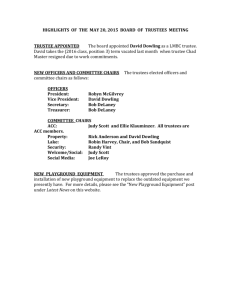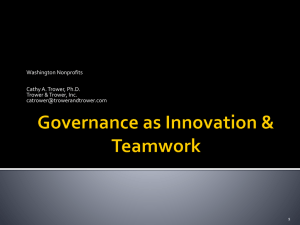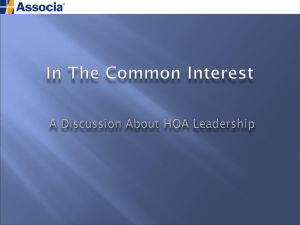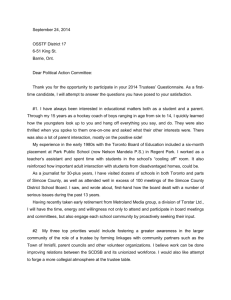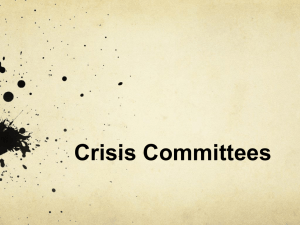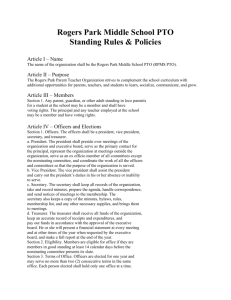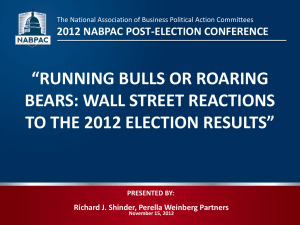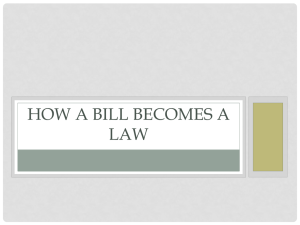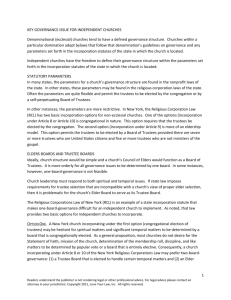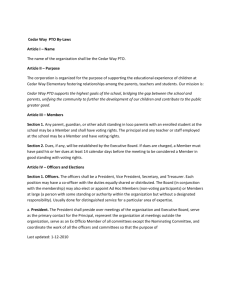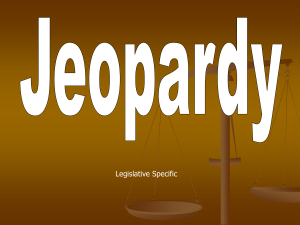Holding Effective Public Library Board of Trustee Meetings
advertisement
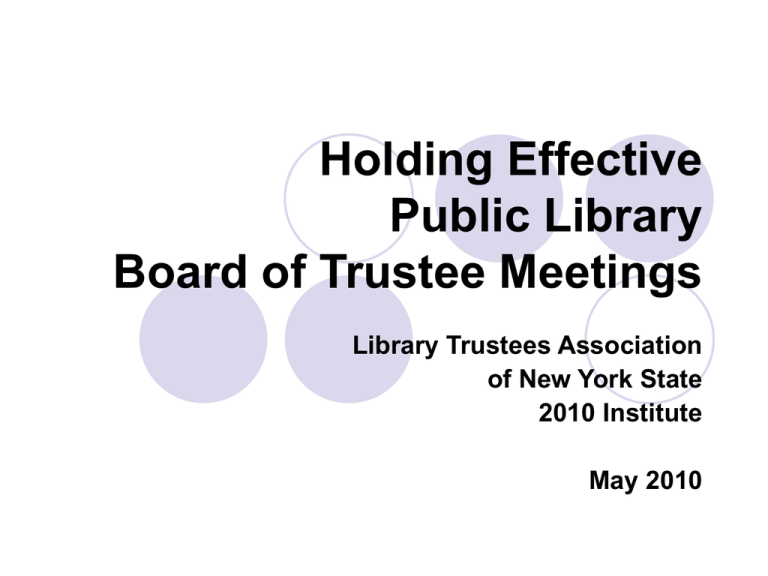
Holding Effective Public Library Board of Trustee Meetings Library Trustees Association of New York State 2010 Institute May 2010 Trustee Roles Create and develop the mission of the library Select a qualified library director Secure adequate funding for the library’s service program Exercise fiduciary responsibilities Adopt policy Plan and evaluate the library’s service program Maintain a facility that meets the library’s and community’s needs Promote the library in the community Conduct the library’s business in an open and ethical manner Collective Authority Under New York State law, a library board has broad authority to manage the affairs of the library but it is a collective authority Individual trustees may not speak or act on behalf of the library unless granted that authority by a vote of the board at an open public meeting The board should speak with one voice once a decision has been made A trustee who disagrees with a board decision may legally speak out publicly but they must make it clear that they do not represent the library Bylaws The law of the library Trustees: number of trustees, how elected, residency requirements, terms, and replacement rules Officers of the Board: positions, how elected, term limits, roles, and replacement rules Meetings: when meetings held, special meetings, open and public, quorum rules, reorganization meetings, and agenda Committees: how members and chair appointed, terms, and replacements Fiscal: term of fiscal year Library Director: how appointed, roles and responsibilities, and duty to attend meetings Amendments to the Bylaws: how done Procedure: Robert’s Rules of Order prevail Board Officers - President • Preside at meetings, sets the meeting “tone”, and works with the director to develop the agenda for meetings • Ensures that all board members contribute in a positive manner • Serves as the chief spokesperson for the board • Authorize calls for any special meetings • Appoints committees • Executes documents as authorized by the Board • Serve as an ex-officio voting member of committees • The term of president should be 1-2 years in length to facilitate rotation of leadership responsibilities Board Officers – Vice President • In the event of the absence or disability of the President performs the duties and functions of the President Board Officers – Secretary The Secretary keeps a record of all meetings of the Board (minutes) They should be sure that notices of all regular and special meetings are issued They should be aware of Open Meeting Law requirements, the library's bylaws, and policies and parliamentary procedure They oversee the maintenance of the board’s archives It is OK for a library staff person to be assigned the duties of Board Secretary but their responsibilities need to be clearly stated Board Officers – Finance Officer/Treasurer The Finance Officer/Treasurer see that the Library maintains adequate and appropriate financial records They make recommendations to the Board on the acquisition and disbursement of funds Understand accounting principles and funding sources Are aware of all written board approved fiscal policies and the basic financial procedures used by the library Head the finance committee Help the director to answer questions that other trustees may have about library finances or the audit (School district libraries may not appoint a member of the Board as Treasurer) Code of Ethics Library should have a written code of ethics policy that addresses Conflicts of interest Personal benefit Confidentiality of board business Before the Meeting Bring issues that you wanted covered to the attention of the Chair and/or director before the meeting so that they can be placed on the agenda, Communication is the key to success!!! Review the entire board packet Packets typically include an agenda, previous meeting minutes, administrators reports, financial reports, personnel reports, correspondence, and documents related to business listed on the agenda Ask questions in advance of the meeting so that the library staff can have full and accurate answers for the entire board at the meeting Attendance Regular attendance at board meetings is essential The Board President or director should be notified in advance if attendance is not possible An uninformed trustee cannot make the best possible decision when it comes time to vote Education Law 226 defines missed meeting rules. It is a good idea to define what constitutes a satisfactory excuse for absence in the by-laws Far too often boards tolerate frequent absences Meeting Focus The most effective boards concentrate their time and energy on a few issues that will have a major impact on the library's future Focus your attention on issues that really matter Use the board's time and structure to pursue important issues The board needs information at the right time Ensure that the board works as an effective unit and use all parts of the board Meeting Length Library board meetings generally can be completed within two hours If meetings consistently last longer, consider using committees or staff for further study of issues Respect each others time, leave the personal for before and after meetings If length becomes a problem establish a time schedule on the meeting agenda and stick to it Meeting Agendas Road map for the meeting Stick to the agenda Should be developed in collaboration between the administrators and board president Typical Agenda Call to order Pledge of allegiance Approval of agenda Approval of minutes Personnel report Meeting Agendas cont. Treasurer’s report Report of receipts and disbursements Warrants Correspondence Director’s (and Administrator’s/Trustee) report Committee reports Old business New business Period for public expression Executive session (when required) Adjournment Personnel Reports New York State Education law grants trustees responsibility for approving personnel at the library The changes can take place prior to approval but the Board should review the change in the next personnel report List the names, positions and salary of all new staff and any current staff changing status The report should accurately reflect the nature of the change (Resignation, termination, retirement, new hire, etc.) and relevant details Financial Reports Present a picture of the library’s financial affairs The data generated from the accounting records and presented in the reports serve as the basis for many decisions made by the board and the administration The board, director and all staff tracking the budget must have access to useful and accurate data Understandable Three primary reports; Bank Reconciliation, Line Item and Warrant Open Meetings Law All public libraries in New York, including association libraries, are subject to the Open Meetings law This law requires that library board meetings must be open to the public In addition, working sessions of the board (even if they are not formal meetings) must be advertised and open if a quorum of the board is expected to attend Notice of all board meetings must be sent to the news media and posted in a public place such as the library The Public at Meetings Board meetings are held for the conduct of library business. They are not public hearings about library affairs The Open Meeting Law makes no provision for public participation It is wise to set aside a period for public expression in the agenda In the interests of time and the effective conduct of business, boards are advised to adopt a policy regarding participation by the public in their meetings Individual public comment may be limited but such rules must be consistent If public participation is allowed then all members of the public attending a board meeting, regardless of residency, may speak The Public at Meetings, cont. Best Practices Though not mandated by law libraries should have a time at meetings for the public to express themselves The Board President must control the period for public expression and must consistently adhere to all rules governing the public’s participation at meetings Do not answer questions or get into debates, this time should be reserved for the public to share their thoughts on library issues Use staff for follow up Meeting Minutes “A record or summary of all motions, proposals, resolutions and any matter formally voted upon.” It does not need to be a “transcript” It must include a record of the individual vote of all members on all matters they are present for Executive sessions where decisions are made must have a “record or summary of the final determination” Reorganization meeting minutes are of particular importance Minutes must be on hand for public inspection within two weeks of the meeting, even if they have yet to be approved Board meeting minutes should be kept forever Board Committees Establish committees when it's apparent that issues are too complex and/or numerous to be handled by the entire board For ongoing major activities use standing committees; for short-term activities use ad hoc committees Committees recommend policy for approval by the entire board Committees use board members' expertise but ensure diversity of opinions on the board Committees do not supplant responsibility of each board member Common Standing Committees: Personnel, Budget/Finance, Policy/By Laws, and Facilities Decision Making Question issues until you understand Decisions are made by the consensus of a trustee majority and not necessarily unanimous agreement Once a decision is made by the board, individual trustees are professionally bound to support the consensus decision publicly, even though they might not necessarily agree with the decision privately. When it comes to library board decisions, all trustees should speak with one voice Keys to Good Decision Making Identify clearly what the problem is Develop a list of the alternatives courses of action Choose a solution from the list Implement the solution Evaluate the choice After the Meeting Review minutes, when available, for accuracy Follow up on questions or concerns Review topics discussed but not decided on Take action by committee on issues referred to committee Communicate issues decided to appropriate parties Common Board Problems Drifting board Rushed board Rubber-Stamp board Micro-managing board Angry board Absent board Action Steps Annually review bylaws Annually review meeting procedures As part of the director’s annual review consider board support for director and by director Board, police thyself !
